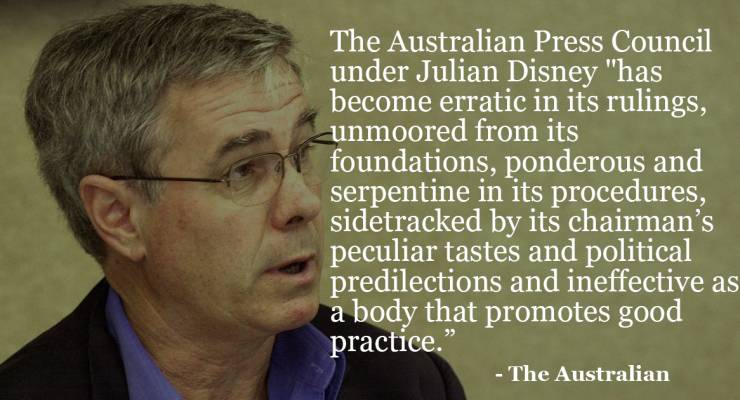
It all started so nicely for Julian Disney, the seriously spoken, studious-looking former law professor, when he was appointed chair of the Australian Press Council in late 2009.
“Professor Disney,” noted News Corp in its formal submission to the federal government’s Finkelstein Inquiry into media regulation in 2011, “has brought a fresh set of eyes and really focused on what the council has needed to do in its priorities … in him our industry has the calibre of its leadership that was sorely lacking.”
Two years later The Australian’s current editor-in-chief Paul Whittaker (then-editor of The Daily Telegraph) wrote: “Since Professor Disney’s appointment the Press Council’s role has been strengthened significantly and this newspaper is committed to fully abiding by it”.
Fast forward to August 2014. In a chest-beating editorial under the headline “Press Council off the rails”, The Australian declared that “this newspaper has lost confidence in APC chairman Julian Disney and deplores the direction in which he has taken the council”. The APC, thundered the editorial, “has become erratic in its rulings, unmoored from its foundations, ponderous and serpentine in its procedures, sidetracked by its chairman’s peculiar tastes and political predilections and ineffective as a body that promotes good practice”. The roots of Disney’s poor stewardship, it concluded, “are found in his biases and ideological activism”.
So how it did all turn so sour for the professor, and the newspaper that immodestly called itself the Heart of The Nation? How could a relationship that started so warmly end with more than 20,000 words of sledging, criticism and often personal attacks that described Disney as left-wing and anti-free speech.
The Holy War against Disney was tied up in another Oz campaign — one against media reforms that would strengthen the Australian Press Council. The push was in the wake of the 2012 Finkelstein review, and while Rupert Murdoch’s News Corp was under increasing scrutiny following the phone hacking scandal in the UK.

In 2013 and 2014, in particular, the council frequently responded to articles in The Australian that they said were inaccurate or misrepresented the council’s position, often without success in getting the record corrected. In an introduction to the 2013-14 annual report of the Press Council, Disney said there had been “serious misrepresentations of council adjudications or other processes” in News Corp publications over the previous few years, “sometimes accompanied by extravagant criticism”.
TOMORROW: How it feels to be a Holy War casualty








Crikey is committed to hosting lively discussions. Help us keep the conversation useful, interesting and welcoming. We aim to publish comments quickly in the interest of promoting robust conversation, but we’re a small team and we deploy filters to protect against legal risk. Occasionally your comment may be held up while we review, but we’re working as fast as we can to keep the conversation rolling.
The Crikey comment section is members-only content. Please subscribe to leave a comment.
The Crikey comment section is members-only content. Please login to leave a comment.